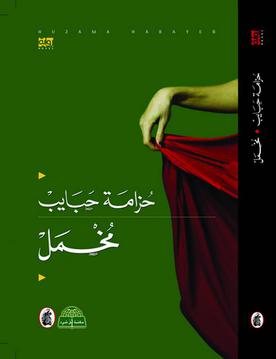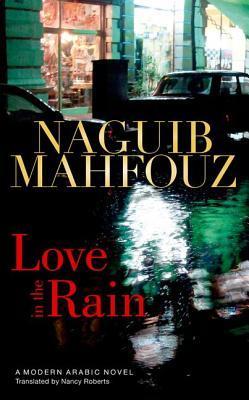
Naguib Mahfouz Abdelaziz Ibrahim Ahmed Al-Basha was an Egyptian writer who won the 1988 Nobel Prize in Literature. Mahfouz is regarded as one of the first contemporary writers in Arabic literature, along with Taha Hussein, to explore themes of existentialism. He is the only Egyptian to win the Nobel Prize in Literature. He published 35 novels, over 350 short stories, 26 screenplays, hundreds of op-ed columns for Egyptian newspapers, and seven plays over a 70-year career, from the 1930s until 2004. All of his novels take place in Egypt, and always mentions the lane, which equals the world. His most famous works include The Cairo Trilogy and Children of Gebelawi. Many of Mahfouz's works have been made into Egyptian and foreign films; no Arab writer exceeds Mahfouz in number of works that have been adapted for cinema and television. While Mahfouz's literature is classified as realist literature, existential themes appear in it.
The Cairo Trilogy is a trilogy of novels written by the Egyptian novelist and Nobel Prize winner Naguib Mahfouz, and one of the prime works of his literary career.

The Journey of Ibn Fattouma is an intermittently provocative fable written and published by Nobel Prize-winning author Naguib Mahfouz in 1983. It was translated from Arabic into English in 1992 by Denys Johnson-Davies and published by Doubleday.
Denys Johnson-Davies was an eminent Arabic-to-English literary translator who translated, inter alia, several works by Nobel Prize-winning Egyptian author Naguib Mahfouz, Sudanese author Tayeb Salih, Palestinian poet Mahmud Darwish and Syrian author Zakaria Tamer.

Naguib Pasha Mahfouz is known as the father of obstetrics and gynaecology in Egypt and was a pioneer in obstetric fistula.
The Thief and the Dogs is one of the Egyptian author Naguib Mahfouz's most celebrated works. He further developed his theme of existentialism using stream-of-consciousness and surrealist techniques. It charts the life of Said Mahran, a thief recently released from jail and intent on having his vengeance on the people who put him there. The novel was published in 1961, and Said's despair reflects disappointment in revolution and new order in Egypt—as Said is not only a thief, but a kind of revolutionary anarchist.

Midaq Alley is a 1947 novel by Egyptian author Naguib Mahfouz, first published in English in 1966. The story is about Midaq Alley in Khan el-Khalili, a teeming back street in Cairo which is presented as a microcosm of the world.
Yahya Haqqi was an Egyptian writer and novelist. Born to a middle-class family in Cairo, he was a lawyer by profession who graduated from the Cairo School of Law in 1925. Like many other Egyptian writers, such as Naguib Mahfouz and Yusuf Idris, he spent most of his life as a civil servant, supplementing his literary income; he eventually rose to become adviser to the National Library of Egypt.

The American University in Cairo Press is the leading English-language publisher in the Middle East.

The Naguib Mahfouz Medal for Literature is a literary award for Arabic literature. It is given to the best contemporary novel written in Arabic, but not available in English translation. The winning book is then translated into English, and published by American University in Cairo Press. It was first awarded in 1996 and is presented annually on December 11, the birthday of Nobel laureate Naguib Mahfouz, by the President of the American University in Cairo.

The Mirage is a 1948 Egyptian novel by Naguib Mahfouz. The novel was filmed as al-Sarab by Anwar al-Shinawi. Mahfouz has said that it is a personal novel based on his upbringing. Novel translated to English by Nancy Roberts.

Velvet is an Arabic language novel by Palestinian author Huzama Habayeb published in 2016. The book won the Naguib Mahfouz Medal for Literature in 2017. The novel depicts several Palestinian women experiencing tragic love stories under the compelling circumstances and within the ultraconservative community of Baqa'a refugee camp in Jordan.
Ibrahim Fathi was an Egyptian writer, intellectual and critic of the 1960s. He was called the dean of leftist intellectuals; he has numerous articles and papers published in various Arabic and foreign periodicals. In addition, Fathi was briefly a part of HADETU. Fathi was honored in 2018 at the Supreme Council of Culture of Egypt for his intellectual output and role in enriching the intellectual life. In addition, Najib Mahfouz praised his writing by criticizing his works.

Mohamed Ali Rafie is an Egyptian novelist, screenwriter and writer, born in Al- Zahir neighborhood in Cairo in 1972. He has a number of printed story collections, the most famous of which are Honey Noun and The Possessiveness of Water. He started writing in the first joint book with two friends of his, entitled “The Path of the Pavements” and then followed it with a collection of short stories entitled “ Ibn Bahr” and a few years later another collection of short stories entitled “The Pomp of Water” and in the meantime he formed many literary groups with his writer friends.

Autumn Quail is a novel by the Egyptian writer Naguib Mahfouz. It is considered to be one of his more philosophical works. The novel looks at foreignness, the past, and the everchanging reality through the character Isa Al-Dabbagh. This novel was originally published in 1962 and was later adapted into a foreign language film in 1967. The film was directed by Hussam Addein Mustafa. The novel was then translated into English in 1985 under the title "Autumn Quail."
Mirrors (Al-Maraya) is Naguib Mahfouz's 1972 novel. In it, Mahfouz creates portraits of the characters. The novel does not parallel the traditional Arabic novel, for it focuses on the characters instead of the plot in an attempt to create artistic images of people who were actual contemporaries of Mahfouz. He does this by shedding the light on the secretive and known aspects of the characters' lives and closely connecting them to the plot and the plot's effect on their lives. Additionally, Mahfouz incorporates his own opinions on these characters and the political eras they lived through.

Love in the Rain is one of Naguib Mahfouz's most popular novels. It received a lot of acclaim from critics, and readers. The novel was adapted into a film in 1975, and it was directed by Hussein Kamal, starring Mervat Amin, Ahmad Ramzi, Adel Adham, Imad Hamdi, Magda Al-Khatib, Hayat Qindil, and other notable actors.
Sugar Street, first published in 1957, is the third novel in the Cairo Trilogy by Egyptian novelist Naguib Mahfouz. In this third novel, the main character Kamal, the youngest son of Ahmad 'Abd al-Jawad who is a young child in the first and a student in the second, is a teacher.

The 1988 Nobel Prize in Literature was awarded to the Egyptian writer Naguib Mahfouz (1911–2006) "who, through works rich in nuance – now clear-sightedly realistic, now evocatively ambiguous – has formed an Arabian narrative art that applies to all mankind." He is the first and only Arabic–Egyptian recipient of the prize.
Heart of the Night is an Egyptian film first released in 1989. The film is directed by Atef El Tayeb, features a screenplay by Mohsen Zayed based on the novel of the same title by Naguib Mahfouz, and stars Nour El-Sherif, and Hala Sedki. The film adapts the novel's unconventional storytelling while hewing closely to the periods in which the narrator, Jaafar Ibrahim al-Sayed, set the tale. A metaphysical allegory, the film discusses man's endless search for safe harbor since his descent into the world with original sin and free will as his eternal burdens.











